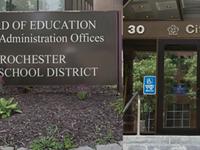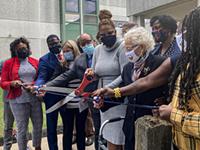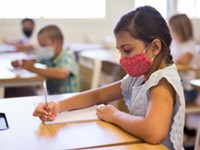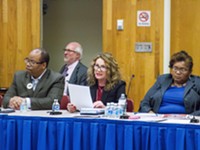Tuesday, March 22, 2016
Teachers contract sidesteps work on student discipline, advocates say
Posted By Tim Louis Macaluso on Tue, Mar 22, 2016 at 1:25 PM
The Rochester City School District and the Rochester Teachers Association have negotiated a tentative new contract and some of the deal's contents are catching people by surprise.
A section concerning personal injury benefits, in particular, is receiving a lot of attention: “Crimes committed in schools will be pursued as crimes committed elsewhere to the extent the District has the right to press charges for those crimes," it says. "In all other events, the District will fully support the teacher who chooses to press charges on his/her behalf.”
The strong language comes despite efforts by several groups to change the way that the district handles discipline. They criticize the district's high rate of suspensions and say that the district tends to criminalize student behavior.
The Rochester Community Task Force on School Climate, initiated by former superintendent Bolgen Vargas with the help of the Rochester Area Community Foundation, Metro Justice, Teen Empowerment, and several other education and community groups worked together to come up with a set of recommendations that steer the district away from “zero-tolerance” approaches to student conduct and discipline and more toward restorative justice practices.
The Task Force strongly advised that the entire district undergo anti-racism training and use suspensions, expulsions, and arrests as a last resort. The groups urged the Rochester school board to approve a new Code of Conduct policy that encourages a more nurturing approach to student behavior issues.
But the board never approved the draft policy and it was never clear why.
The language in the proposed teachers contract seems to reflect old thinking, according to some members of the Task Force.
“I think we were all taken aback,” says Jennifer Banister, development and collaborations manager with Teen Empowerment. Banister says that the students, teachers, administrators, and community leaders working on changing school climate have been transparent and inclusive. So the language in the new agreement was a surprise, she says.
But Adam Urbanski, president of the Rochester Teachers Association, insists that the new contract does not conflict with the task force's objectives.
“We shouldn’t criminalize student misbehavior,” he says. “But surely that doesn’t mean that if a person commits a serious crime that it not be treated as a crime.”
Urbanski says that the contract is referring to crimes such as rape or assault with a deadly weapon.
“It’s not criminalizing because it’s already a crime,” he says.
Banister says that the task force is working to improving the school environment for teachers, as well as students.
And some of that work has already begun with some schools using restorative justice approaches to student discipline. But Banister questions why the board would approve a new contract before approving a new Code of Conduct policy.
But the bigger problem of how to address student misbehavior and classroom disruption may be broader and more complex than the school board and administrators know how to address.
The issue was put in stark terms at a recent meeting of the Association of Supervisors and Administrators of Rochester with school board President Van White. In a room of about 100 principals, supervisors, and administrators, many said that they need more effective ways to deal with children who have serious mental health diagnoses. Addressing the growing number of children with social emotional needs as young as 3 and 4 is one of their biggest concerns, they said.
Some administrators said that they could observe pre-kindergartners and tell which children will have problems with violence and other behaviors if they don’t receive help.
One administrator said that she spends as much as 80 percent of her time dealing with those problems in older children. And keeping those problems from interfering with their peers’ learning is becoming increasingly difficult, she said.
Finding alternative ways to help city school children before they get into serious trouble is something that both Banister and Urbanski agree on. Certainly not every kid in city schools who misbehaves has a mental health problem, and we know that many children who live in poverty are resilient and overcome their situation.
But many cannot, and that is leaving the Rochester school district to once again come up with the answer.
A section concerning personal injury benefits, in particular, is receiving a lot of attention: “Crimes committed in schools will be pursued as crimes committed elsewhere to the extent the District has the right to press charges for those crimes," it says. "In all other events, the District will fully support the teacher who chooses to press charges on his/her behalf.”
The strong language comes despite efforts by several groups to change the way that the district handles discipline. They criticize the district's high rate of suspensions and say that the district tends to criminalize student behavior.
The Rochester Community Task Force on School Climate, initiated by former superintendent Bolgen Vargas with the help of the Rochester Area Community Foundation, Metro Justice, Teen Empowerment, and several other education and community groups worked together to come up with a set of recommendations that steer the district away from “zero-tolerance” approaches to student conduct and discipline and more toward restorative justice practices.
The Task Force strongly advised that the entire district undergo anti-racism training and use suspensions, expulsions, and arrests as a last resort. The groups urged the Rochester school board to approve a new Code of Conduct policy that encourages a more nurturing approach to student behavior issues.
But the board never approved the draft policy and it was never clear why.
The language in the proposed teachers contract seems to reflect old thinking, according to some members of the Task Force.
“I think we were all taken aback,” says Jennifer Banister, development and collaborations manager with Teen Empowerment. Banister says that the students, teachers, administrators, and community leaders working on changing school climate have been transparent and inclusive. So the language in the new agreement was a surprise, she says.
But Adam Urbanski, president of the Rochester Teachers Association, insists that the new contract does not conflict with the task force's objectives.
“We shouldn’t criminalize student misbehavior,” he says. “But surely that doesn’t mean that if a person commits a serious crime that it not be treated as a crime.”
Urbanski says that the contract is referring to crimes such as rape or assault with a deadly weapon.
“It’s not criminalizing because it’s already a crime,” he says.
Banister says that the task force is working to improving the school environment for teachers, as well as students.
And some of that work has already begun with some schools using restorative justice approaches to student discipline. But Banister questions why the board would approve a new contract before approving a new Code of Conduct policy.
But the bigger problem of how to address student misbehavior and classroom disruption may be broader and more complex than the school board and administrators know how to address.
The issue was put in stark terms at a recent meeting of the Association of Supervisors and Administrators of Rochester with school board President Van White. In a room of about 100 principals, supervisors, and administrators, many said that they need more effective ways to deal with children who have serious mental health diagnoses. Addressing the growing number of children with social emotional needs as young as 3 and 4 is one of their biggest concerns, they said.
Some administrators said that they could observe pre-kindergartners and tell which children will have problems with violence and other behaviors if they don’t receive help.
One administrator said that she spends as much as 80 percent of her time dealing with those problems in older children. And keeping those problems from interfering with their peers’ learning is becoming increasingly difficult, she said.
Finding alternative ways to help city school children before they get into serious trouble is something that both Banister and Urbanski agree on. Certainly not every kid in city schools who misbehaves has a mental health problem, and we know that many children who live in poverty are resilient and overcome their situation.
But many cannot, and that is leaving the Rochester school district to once again come up with the answer.
Speaking of...
Latest in News Blog
More by Tim Louis Macaluso
-

RCSD financial crisis builds
Sep 23, 2019 -

RCSD facing spending concerns
Sep 20, 2019 -

Education forum tomorrow night for downtown residents
Sep 17, 2019 - More »




